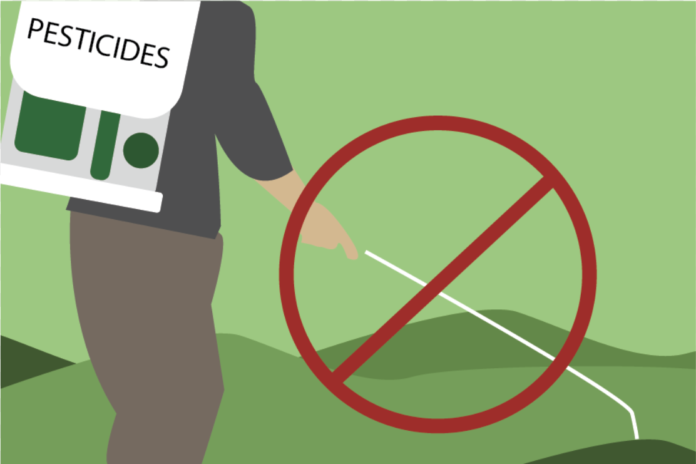Focus on environmentally-friendlier weed control alternatives over chemical products
Updates to the City of Davis’ pesticide application suggest that there was only one chemical application in Davis parks throughout 2018 and thus far in 2019. The city’s Integrated Pest Management policy established an emphasis on cultural and mechanical ways of weed control over pesticide use.
The Pesticide Information Hotline offers transparency for the public on the date and location of each pesticide application in addition to e-notifications. The Anticipated Pesticide Application Calendar also informs people 48 hours prior to the application of a pesticide. The last documented spraying in a park was on May 7, 2018 in Arroyo Park. Sprayings, however, still occur in the city’s open space areas.
Alan Pryor, a member of the National Resource Commission and the Hazardous Materials Subcommittee, advocated for the decreased use of pesticides for safety concerns.
“We wanted them to fulfill that promise to their citizens,” Pryor said. “We demanded accountability. All this led to the newground changes implemented a new IPM policy that required all these notifications like email and signs being put up.”
The changes occured after former IPM Coordinator Martin Guerena resigned from his position following disagreements with upper management regarding pest management. Near the end of his employment with the City of Davis, Guerena found that the IPM program was not always considered a “priority.” Guerena still established a downward trend in pesticide use, which earned him the city’s Environmental Recognition Award in 2018.
“You can see the history,” Guerena said. “I was there for 10 years, so I’ve made the annual report every year, and it showed a steady decline — not total elimination — but a steady decline of the major pesticides.”
Since then, the IPM Policy, last updated in 2017, requires signage indicating an application location and phased-out use of glyphosate. According to John McNerney, the Wildlife Resource Specialist for the City of Davis, the city is moving away from chemical herbicides overall in response to concerns over “pesticide hazards to non-target organisms,” such as humans and wildlife.
“Multiple control methods are utilized including mechanical, cultural, biological, and chemical,” McNerney said via email. “Chemical control methods are considered the ‘last resort’ when all other methods are either not working or are known to be the only effective method of control. When needed, only least-toxic chemical pesticides are considered for application in parks, greenbelts or other high use public areas.”
Instead, the city uses mechanical methods such as weed whackers and weed flamers, as well as significant amounts of mulching to inhibit weed growth. McNerney also credited “the change in land use [and] pest management requirements at our wastewater treatment facility” with reducing the city’s pesticide use. Extension Weed Specialist, Brad Hanson, notes the benefits and potential drawbacks to non-herbicide weed control.
“Any weed control effort is really a series of tradeoffs,” Hanson said. “You can do it with chemicals like the herbicides, you can do it with labor crews, people pulling and hoeing weeds, that has a different set of tradeoffs in terms of logistic costs and social justice. You can do it with mechanical cultivation using tractors and tillage implements and that has a carbon footprint and speed of operation. So there’s not really a one-size-fits-all approach to weed control.”
In 2015, the International Agency for Research on Cancer, an arm of the World Health Organization, categorized glyphosate, a common active ingredient in pesticides, as a group 2a carcinogen. The decision followed lawsuits alleging that the ingredient, found in popular Roundup products, caused cancer, which may have further precipitated Davis’ battle against pesticide use. Pryor shared his praise for the city’s actions.
“It appears the city has done 180-degree turn, rather than increasing pesticide usage as we were fearful of –– we lost Martin Guerena –– we have gone way beyond organic-only pesticides,” Pryor said. “They’ve gone to functionally pesticide-free parks in Davis in the last year.”
Guerena finds that the ability to sustain this trend of pesticide-free parks is unpredictable.
“Especially right now with it being a wet year, you’re going to have a lot of weeds emerge, and they’re either going to have to physically remove them or probably apply more pesticides to catch up,” Guerena said. “So in other words, not doing anything is not an option.”
Hanson noted that Davis may, in theory, be able to bear the economic responsibility of being pesticide-free.
“That may not be achievable in every similar size city,” Hanson said. “It may be sustainable given the ability of a relatively high-net income city like Davis. If they are able to eliminate pesticides, then more power to them.”
Moving forward, Pryor expressed his desire for the Davis Joint Unified School District to follow the lead of the City of Davis and the Woodland Unified School District in elminiating glyphosate use.
Written by: Renee Hoh — city@theaggie.org




